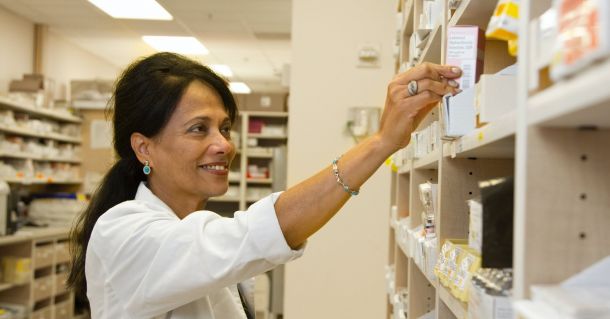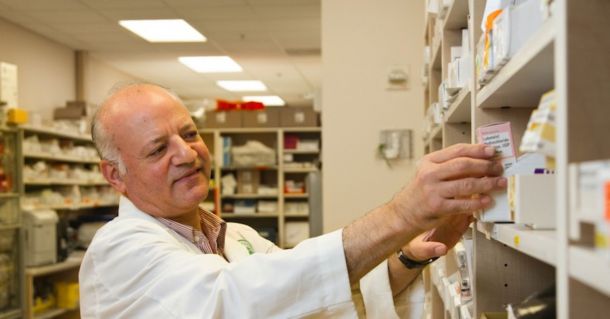Pharmacy Careers: Independent Pharmacy Owner

First Financial Bank
Are you considering or currently enrolled in pharmacy school? Are you an entrepreneur at heart? Owning your own pharmacy may be something you should explore.
Learning how to run a successful business—especially an independent pharmacy—has its own set of unique challenges, but it also has great rewards. As an owner, you’ll get to choose exactly how you serve your specific customers and tailor your services to fit their individual needs, something the big box chains can’t do. There are a number of things to take into account – and with the help of your trusted team of advisors – learn how to start or buy your own independent pharmacy business:
1. Learn from industry professionals.
Learning from professionals who have successfully created an independent pharmacy can help you provide the foundation for your own business. In addition to tactical professionals, like an accountant or financial advisor, legal counsel and an insurance agent, you should also speak with mentors and thought leaders in the pharmacy space.
Consider attending the Pharmacy Ownership and Leadership Academy (POLA) at the University of Arkansas Medical Sciences (UAMS) College of Pharmacy. POLA is a week-long program for student pharmacists where you’ll learn the fundamentals of pharmacy ownership and get a head start on your business plan. The program is open to pharmacy students nationwide and tuition is free. We are proud to say it was co-founded by a member of the FFB team, Schwanda Flowers, Pharm.D.
2. Gain work experience.
Once you complete your studies, you’ll want to get work experience to help prepare you for your own business. Working with and for an independent pharmacy, including as a Pharmacy Manager can provide you with insight and invaluable experience while you make your plans for opening your business.
3. Do your research.
Another important step in laying the foundation for a successful business is adequate research. Get to know the community where you want to start your pharmacy so you understand how to best serve them long-term. Answer these questions: What are the healthcare needs in this community? Are there healthcare facilities nearby? Who is my competition? What can I offer here that others can’t?
Identify any gaps that you can fill in the market—maybe there’s a need for pediatric support, or there is a high incidence of hypertension in the community. Once you’ve done thorough research on your specific market, you can use it to create a thoughtful business plan and forecast financials.
4. Prepare financials.
Consulting with a financial advisor is key to setting up your business for success. According to PioneerRx, opening a pharmacy costs on average $400,000 to $600,000. Because of this high cost, you will likely need to acquire a loan from a bank and/or seek out investors to support you with financing. Plan to set up a pharmacy bank account so you’re ready to process funds once you and your financial advisor devise a plan.
Due to start-up costs, inventory financing, and day-to-day operations, etc. profits won’t be immediate. Many of your customers will only pay a portion of the cost for their prescriptions, and you’ll be waiting on third-party payers (private or public healthcare insurance) for the balance. A financial advisor can help you plan for this delay in profit and incorporate it into your business plan, which will be reviewed by lenders and investors.
5. Understand legal and tax requirements.
Before you open your independent pharmacy business, you’ll need to obtain the appropriate licenses. This can vary by state, but will most likely include:
- State Board of Pharmacy Permit
- Drug Enforcement Administration (DEA) Number
- National Provider Identifier (NPI) Number
- Medicare Provider Enrollment
- National Association of Boards of Pharmacy (NABP) Number
- Employer Identification Number (EIN)
You’ll also need to establish tax accounts with other authorities, including:
- State Tax ID Number
- Payroll Tax Account
- Property Tax Accounts
- Sales Tax Accounts
6. Get insurance for your business.
For any business venture, acquiring an insurance policy is absolutely necessary. This will help protect you in the event of unforeseen circumstances or lawsuits and ensure that you are properly covered, which can not only save you money, but avoid a huge headache, too.
Coverage may include general liability, professional liability, and/or employment practice liability insurance. Contact an insurance agent to learn more about what type of policy you need and to decide what’s best for you and your business.

Finding the right location for your pharmacy can make a big difference in the success of your business. If you haven’t already, do some research on the demographics in the area to ensure that you’ll be providing for your target market. You should also consider the physical location of the buildings you look at to ensure they’re in high-visibility areas, but aren’t inconveniently located. Ask yourself these questions: Is it in a walkable location? If not, is there ample parking? Is it easy to see from the street? Are any competing pharmacies nearby? Will there be room to grow here?
Believe it or not, many people may find out about your business simply by passing it on the way to work or while running errands, so you want to make sure that your pharmacy’s curb appeal is working in your favor.
8. Build your team.
Once you’ve secured a location, it’s time to start building your team. These are the people who will interact with your customers every day, so consider it a smart investment and spend time vetting each candidate to ensure they are a good fit for your pharmacy. You’ll want to hire to address the roles you outlined in your business plan, which may include technicians, clerks, and potentially other pharmacists who can help operate your business day to day.
After you’ve finalized the roles you need, post the positions on job boards like LinkedIn and Indeed, spread the word on social media or during in-person conversation, and contact local schools that may have recent graduates looking for jobs.
Once you hire your people, you’ll need to schedule, pay, and provide appropriate benefits (and more) to them.
9. Choose equipment and technology.
You’ll also need to acquire the appropriate equipment to run your business. Once you have inventory, you’ll need items like tablet counting machines, liquid dispensers, and mortar and pestles. But you’ll also need customer-facing equipment like cash registers and credit card processors.
Technology is a big part of how your business will operate. Work with your tech advisor to identify which software system you’ll need, plus the functionality of your online “face to the world” – your website – to make it easier for your customers to do business with you.
10. Gather inventory.
Partner with a wholesaler to purchase medications and fill your inventory. Wholesale drug distributors purchase medications directly from the manufacturers and then sell them to pharmacies. It’s important to find a reliable wholesaler who has the proper licensing and will provide you with lower rates and fast delivery. Partnering with the right wholesaler will ensure your customers have access to the medication they need, when they need it. If you are acquiring an existing pharmacy, there may be agreements in place to leverage.
11. Market your business.
Last but not least, it’s time to start marketing your independent pharmacy to the community. Take advantage of traditional marketing techniques like mailers and flyers, but also consider a digital approach by creating a website and promoting your business via social media and paid search ads.
It’s also a good idea to add your business to online directories so that local customers searching for pharmacies can more easily find you. Set up a Google My Business profile to put your business on the map and reach your target market where they are already searching.
Planning for your future
Starting and owning a pharmacy in the US is a great way to serve your community and run your own business. And while it may seem like there are an abundance of tasks to tackle before you have a successful business, you don’t have to—and shouldn’t—do it alone. You’ll want to build your team of trusted advisors, plus explore trade associations such as the National Community Pharmacists Association (NCPA) for info and resources as you plan for owning an independent pharmacy.
Want to learn more about the POLA program? Check it out here. Want to discuss your plans? Let’s chat.

What Do You Need to Know to Buy a Pharmacy?
Learn more details about how to buy a pharmacy and calculate your monthly mortgage.

Pharmacies For Sale: What You Need to Know
Doing your due diligence is essential to ensuring you understand the true value of a business and its potential for your future.

Planning to Sell a Pharmacy Business?
Ready to hang that “Pharmacy Business for Sale” sign in the window?

